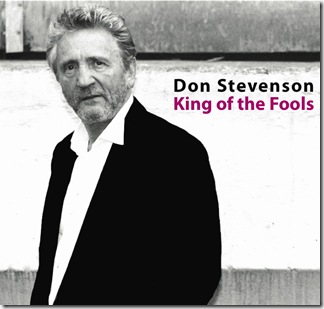Moby Grape was, perhaps, the best band to come out of the San Francisco scene in the 1960s. Unfortunately, their label screwed things up for them by releasing, simultaneously, five singles from their first album. To this day, the release of an album by a Grape is an event to be celebrated. Don Stevenson is the last member of the group to release a solo album and it is, indeed, a cause for celebration.
There are moments of unexpected joy in every life. The note that came with my review copy of The King of Fools, by Don Stevenson, is one such moment. Stevenson, who was an original member of Moby Grape, the ‘60s band that should have had monster sales to go with their nearly universal critical acclaim, dashed off a personal, handwritten note to accompany the package, “Hi Sheldon, I am the last Grape to produce a solo album. It took me long enough. Hope you enjoy. Thanks, Don Stevenson.”
After that, I had a few moments of trepidation. What if the album didn’t live up to the warmth of that simple note? After all, the albums by other former Grapes tended towards brilliance [find copies of Skip Spence’s OAR, or Bob Mosley’s eponymous 1972 album – I’ll wait]. Fortunately, it exceeded my expectations – which were high before I ever read the note.
Right from the get-go, Moby Grape were a rave-up rock & roll band with obvious jazz and country influences. Their first four albums reflected all sides of their complexity – Moby Grape rocked like a house afire; Wow/Grape Jam moved from a pretty rockin’ studio disc [ahhh, the days of vinyl…] to a live disc of jazzy extended numbers; Moby Grape ’69 began an evolution toward county rock without losing the edge of the first album; and finally, Truly Fine Citizen settled into country rock with a touch of down home blues. Stevenson’s contributions to Moby Grape may have underestimated by some, but the guy co-wrote Hey Grandma and 8:05 – and they both left their mark on me.
The King of Fools finds the 68-year old Stevenson rocking maybe a tad bit less, but the album is a brilliant, rootsy aggregation of rock, blues and country – and is comparably in quality to both the best of Grape and its members’ solo albums.
Stevenson’s Getting Used To Being Treated Wrong opens with a guitar intro that would be at home on Truly Fine Citizen before turning into a bit of a stomper, with Stevenson’s vocals expressing anguish and resignation in an almost howl that brings the song’s title into sharp relief. It’s a fire-breathing opener that sets the tone for the album – fluidity, grace and rawness all somehow working together to grab the listener by the heart.
Walking In The Fire mixes county licks [especially some gorgeous fills and a solo from Bobby Black on pedal steel] with a loping reggae beat, while Laa Laa [I Want To Be With You] is a beautifully simple, straightforward ballad that switches tempos for a brisk, jaunty verse then slowing again for a tasty guitar break before finishing with a jazzified country guitar and pedal steel duel that melds into a harmonious blend before ending on a high note.
I’ll Be There for You is pretty straightforward country ballad with lush harmonies and propulsive finger picking; Train [.44 Blues], one of two covers on the album [by Roosevelt Sykes], is – as the title suggests – a blues song about a train, but not quite the train song you might be expecting.
We Gonna Make It is a bluesy wailer of moderate tempo with a fine sax line and solo from Scott Barnhill and terrific harmony vocals by Melody Price – and Stevenson sounds like the Grape wailer of old; his voice simultaneously warm and raw [raw like a warm, scratchy horse blanket – not sandpaper].
The title song is a quiet, moody, jazzy moment of introspection that seems almost wispy, while Forbidden Love In Paradise returns to that country/reggae feel to give an underlying uplift to the subject of lost love. Love Is Slipping away is a mournful tale of losing love a degree at a time and not noticing until it’s too late – the sting of loss coming from darting guitar licks.
The album’s penultimate song, True Love Song, is one of homecoming and gratitude for life’s blessings – and Stevenson’s vocals are mellower and, if possible, even warmer. Adding to the warmth is the fact that the song is performed on acoustic instruments.
The finale, Sonny Terry and Brownie McGee’s Cornbread, Peas and Black Molasses, reminds, musically, of Murder In The Heart For The Judge, though it couldn’t be farther away lyrically. Some fancy acoustic picking supports Stevenson and the overall feel winds up being kinda spiritual.
It is a joy to hear Stevenson weaving guitar magic with fellow Grape, Jerry Miller, on a number of tracks – it’s like they’ve never stopped playing together. Which is not to suggest the other guitarists involved haven’t been excellent as well – it’s just that there’s an undefined special magic that occurs when Stevenson and Miller start cookin’.
When a Grape makes music, it’s always been a cause for celebration. The King of the Fools keeps the string intact. Buy. Enjoy. Celebrate.
Final Grade: A+
Album cover photo courtesy of Open Path Music.
